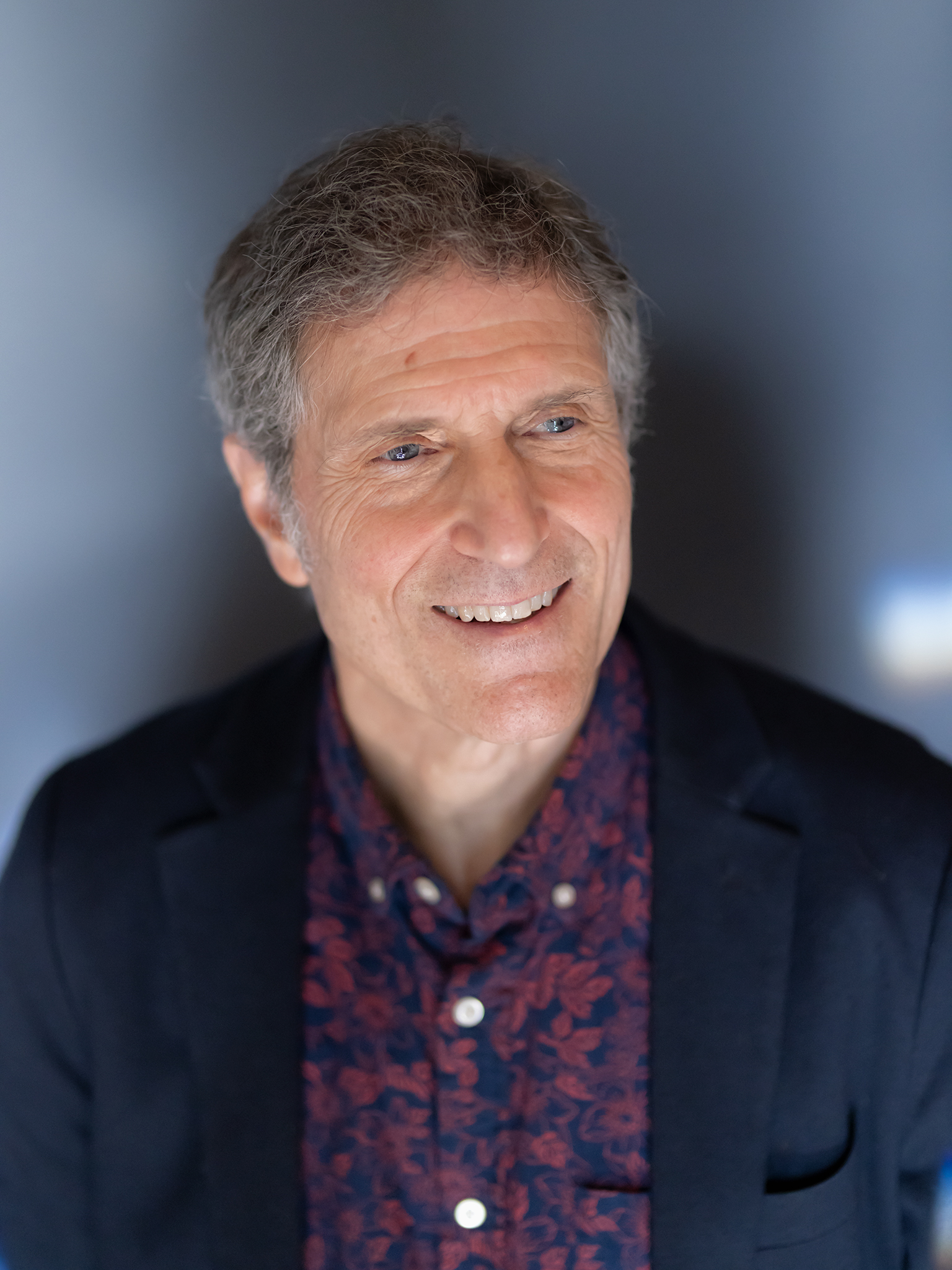The Beat Goes On
by David Jager
photography by Horst Herget
Eclectic is not an adjective that holds a lot of meaning for musician Aaron Davis (BFA ’79). But he is the very definition of the word.
In his long and storied musical career, Davis has delved into the dense polyrhythm of Latin and funk with his band Manteca. He has explored every nook and cranny of the jazz, popular, world and pop songbook as founding member and pianist for the internationally acclaimed Holly Cole Trio. And he continues to accompany and collaborate with celebrated Canadian soprano Measha Brueggergosman-Lee on a repertoire that embraces art song, jazz, spirituals and gospel – notably on a new collaboration based on poems by literary giant Margaret Atwood.
If this weren’t enough, he has also provided a wealth of tonal soundscapes for film and television that draw inspiration from every available style of the world music palette.
York gave me a way to listen to and understand music from a variety of idioms … without the hierarchy
A resident of Toronto since 1975, Davis began his training in musical pluralism at York University nearly 50 years ago.
“York gave me a way to listen to and understand music from a variety of idioms … without the hierarchy,” Davis says during a recent phone call where the audible pep in his voice makes it clear that he remains fascinated and engaged with what he learned at his university. “This was possible,” he continues, “because there were so many remarkable teachers there,” he recalls. He singles out some of the professors who left an indelible impression.
“For jazz piano and theory, John Gittins really helped. Casey Sokol was a classical prodigy and chamber musician, an improviser in his own unique style. He’s always been highly experimental, and he opened my ears to a lot of things. Balinese, classical, African music and all the different global cultures of improvisation.”
Davis is adamant that without his five years of training at York, his musical journey might never have blossomed. In fact, there was a point where he felt it might not develop at all.
“I had started piano very early, did some classical, but I lost interest as soon as I discovered the Beatles and other pop bands. I formed a band in the fifth grade with my friends and played Beatles covers, Beach Boys, Peter, Paul and Mary. Later, in 1975, I played at the legendary Le Coq d’Or tavern on Toronto’s Yonge Street with the Terry Logan Band. As you well know, there was a revolution in music during the ’60s.”

Davis’s mother worked as a professor at the University of California, Berkeley, in the late 1960s, so Davis was able to visit and experience the Berkeley music scene firsthand at its epicentre. He remembers an evening at San Francisco’s historic venue The Fillmore in 1968.
With so many well-versed teachers who were also performers and improvisers, they were able to approach me at my level and help me find a way into music. It just clicked for me
“Over two nights, I saw Blood, Sweat & Tears, James Cotton, Cream and the Jimi Hendrix Experience among other idiomatically-varied playing innovators, one after the other, all live, and all for the single admission price of around three dollars!” he recounts, still marvelling over his great luck in seeing these late-20th century musical giants all at once. “Everything had shifted. All kinds of music that were previously obscure or unknown were suddenly very cool. Blues, jazz, soul, funk, country, Indian classical, classical, world music. It was suddenly possible to delve into anything. It was like being a kid in a candy store.”
But still unsure of his direction, musical or otherwise, Davis then returned to eastern Ontario to join a hippie-esque intentional community with a shared purpose involving home-grown food and shared manual labour.
“We were back-to-the-landers without heat, water or electricity. We were trying to live differently. But I wanted to pursue something other than just homesteading. That’s when someone told me about the amazing program at York, and I decided to attend.”
Largely self-taught when he entered the program, Davis knew the gaps in his musical understanding needed to be filled in, but without compromising his passion or curiosity.
“I was so green, I didn’t even know theory,” he says. “With so many well-versed teachers who were also performers and improvisers, they were able to approach me at my level and help me find a way into music. It just clicked for me.”
The training was as rigorous as it was exploratory. He remembers that Lorne Lofsky, a jazz student and guitarist in the program with him, was committed to memorizing three tunes a day. Davis himself was enrolled in five courses that helped him to develop a deep interest in polyrhythm and world drumming, among them the classes he had with Trichy Sankaran, a master of Indian classical Carnatic drumming. “The emphasis on world music and rhythm is still very strong at York, but it was really unique for the time,” he says.
This blend of different musical universes moulded Davis into the musician he is. Success followed soon after he graduated from York.
Davis started out as the pianist for Latin and world music pioneers Manteca, where his love of polyrhythm and brass arrangement skills came very much in handy. He then founded the Holly Cole Trio, which is recognized as one of the premiere jazz and adult contemporary ensembles of the last 30 years.

Established with Canada’s internationally acclaimed jazz-diva Holly Cole and bassist David Pilch in 1986, Davis’s audacious and adventurous ear no doubt contributed to Cole’s incredibly diverse repertoire and unique sound. The trio moved from success to success until it threatened to overwhelm his life.
“Manteca kept me busy from 1979 to 1991. I was also working with the Holly Cole Trio for much of this time, which was playing everywhere. Eventually it got too busy. I chose to leave Manteca after the scheduling conflicts just became too much.”
Holly Cole remained a musical constant for Davis, while he also became involved in composition, as well as a cluster of ongoing musical projects, such as the Aaron Davis Circle of Friends,a shifting lineup of leading Toronto instrumentalists and singers who perform Davis’s compositions.
Today, his collaborations include new projects with, among others, Brueggergosman-Lee. At home with both the operatic and jazz worlds, the internationally acclaimed singer has specialized in art song recitals that have graced the stages of New York’s Carnegie Hall, London’s Wigmore Hall and Washington’s Kennedy Center.
Davis’s musical flexibility once again ensured that her repertoire would be as broad as Holly Cole’s has been. They collaborate actively on repertoire and arrangements that incorporate classical, jazz, gospel and dance, with Brueggergosman-Lee relying on what she calls “the unwavering genius of Aaron Davis on my side.”
With Davis, she is premiering a new song cycle inspired by Margaret Atwood’s 2020 book of poetry, Dearly. Billed as a “unique blending of the classical concert aria and jazz-influenced art song,” Zombie Blizzard will have its world premiere at the Jane Mallett Theatre in Toronto on March 3, with Davis performing with the Hannaford Smaller Band. “These are seven songs based on Atwood’s recent poetry,” Davis explains. “I composed the arrangement for piano, Measha, bass drum and ten brass instruments from the Hannaford Silver Street Band: a 33-minute-long song cycle. It was challenging because there is no regular metre or rhyme to these poems, but the journey has been very exciting.”
His unwavering devotion to the innovative, genre defying and yes, eclectic in music continues to astonish and delight new listeners everywhere, no small thanks to York’s innovative faculty and music program. ■